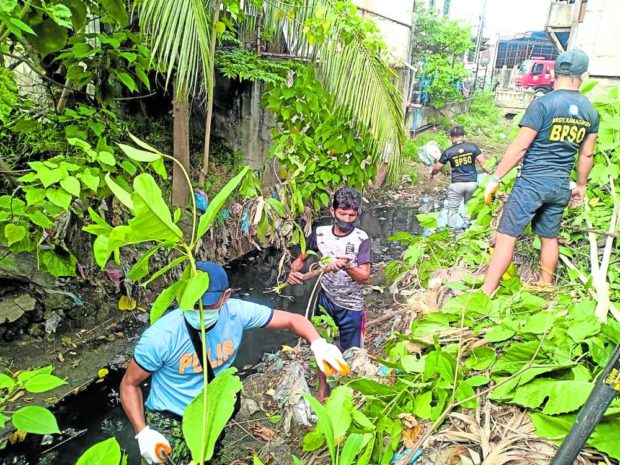Cimatu begins new role as anti-flood task force chief in Cebu City

VOLUNTEER COPS Central Visayas police officers and personnel conduct a cleanup drive in one of the rivers of Cebu City on Sept. 15. —Nestle Semilla
CEBU CITY — Former Environment Secretary Roy Cimatu has come out of retirement to lead a special task force to clear and clean up all the seven major rivers here.
Cimatu, named an adopted son of Cebu at the height of the COVID-19 pandemic for assisting the city in curbing the surge of the disease, hoped to rehabilitate and replicate what he did in Boracay, Manila Bay, and the rivers of Marikina and Cagayan in northern Luzon.
He, however, admitted there was so much work to be done in Cebu City, which has a bigger area than his previous cleanup assignments.
“It will be very difficult,” the retired Army general said.
Clogged waterways
Cimatu said he was already in his home province Ilocos Norte planting papaya when Mayor Michael Rama called him up and asked for his help. He immediately agreed.
Article continues after this advertisementHe said the job in Cebu City could not be completed in just a few years, but he hoped to jump-start the process of doing the right things for the generations to come.
Article continues after this advertisement“It is a challenge, really, but with your cooperation, maybe we can do it now for the next generation, for a better and new Cebu City,” Cimatu said.Cebu City has experienced severe flooding during heavy rains in the past weeks. The problem was blamed by local government officials on clogged rivers and waterways.
The local government has announced it would clean up and dredge the seven rivers in the city starting on Sept. 17, alongside the launching of the Task Force Gubat sa Baha (War on Flood) headed by Cimatu.
Cimatu said the rivers would also be cleared of illegal structures, including commercial establishments and dwellings of informal settlers.
The city government recently advised affected entities to voluntarily demolish their homes or structures so they could save their belongings.
The petition
Informal settlers would be transferred to medium-rise condo buildings donated by a private firm at the South Road Properties and would receive P35,000 each from the Department of Public Works and Highways.
“If there are illegal structures there, then they are violating the law. I know they know there is a (3-meter) easement rule. I suggest they self-demolish already,” Cimatu added.
Last Tuesday, city hall announced it would petition the Supreme Court to issue a writ of kalikasan in a bid to clear the riverbanks from informal settlers and commercial establishments that encroached on the 3-meter easement zone. A writ of kalikasan would also compel national agencies to act and free the rivers of obstructions.
According to the Environmental Management Bureau, all seven major rivers in Cebu City—Guadalupe, Kinalumsan, Mahiga, Lahug, Estero de Parian, Bulacao and Butuanon—were already “dead” since they have ceased to perform their ecological functions, including sustaining any form of life such as fish and aquatic plants.
About 14,000 to 18,000 structures that encroached all seven rivers in Cebu City need to be demolished. So far, the city has given notices of eviction to at least 2,000 households and establishments.